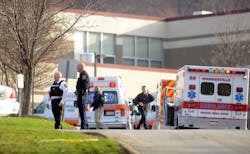New FBI Special Agent in Charge Tested Early in Pa.
On Scott S. Smith's third day on the job as the region's top FBI man, Franklin Regional High School's science hallway was turned into a corridor of discarded backpacks and shed blood, spurring a massive law enforcement response.
"It was a horrific incident," Mr. Smith, the new special agent in charge for Western Pennsylvania and West Virginia, said in a Tuesday interview at the Dixon Federal Building on the South Side. "Behind the scenes, though, there's a lot of investigative activity, evidence collection, witness interviews that have to be done, and they have to be done then."
Mr. Smith, upon the request of the Murrysville police, dedicated 20 agents to evidence reconstruction and interviews with victims and witnesses. His team led the search of defendant Alex Hribal's house, brought electronic forensic expertise to bear and assigned four specialists to help the families of the injured students.
"He was battle-tested in his very first week," said U.S. attorney David Hickton, who was on the scene with Mr. Smith.
Mr. Smith, a 47-year-old Cleveland native, said he won't be personally involved in every investigation, as he was at Franklin Regional. He must, however, approve agents' plans depending on the level of activity, the risks involved and civil liberties considerations, and will set priorities for the office.
He said he is experienced and interested in every aspect of the FBI's work, notably including public corruption, healthcare fraud and cyber crime.
Mr. Smith takes charge of 145 FBI agents, 150 other professionals and 120 local law enforcement officers who are assigned to bureau task forces. In a time of federal belt-tightening, he brings recent Washington experience as the FBI's former chief of employee services.
"I think he's had a wide background of being in the field and in headquarters. That helps," said Mr. Hickton.
"He also was involved in local law enforcement in Cleveland," said Mr. Hickton.
Mr. Smith, an Eastern Michigan University criminology graduate, started his law enforcement career as a deputy sheriff in Lake County, Ohio, working drug cases. That remained his focus after joining the FBI in 1996, and fighting drugs will be a big part of his job here.
"Heroin is something, because of the significant number of overdoses, that we need to be on top of," he said, referencing the two dozen area deaths attributed early this year to fentanyl-laced heroin.
In 2004, Mr. Smith joined many in the FBI in shifting to counter-terrorism work. He then did two stints in Iraq, first as a leader of a team of special agents, analysts and linguists involved in counterterrorism, and then as the deputy on-scene commander.
His job: "Looking for the bomb production facilities, for the IEDs," and connecting dots between extremists in Iraq and people with the potential of striking the United States, he said.
"We could come on to a scene with the military and tell them what's of value," he said.
After his second Iraq stint, Mr. Smith became assistant special agent in charge of intelligence and white collar investigations, including public corruption, for the FBI's Dallas office.
"He had a way about him that worked well," said Diego Rodriguez, the special agent in charge of the FBI's Dallas office. "He was able to balance the professional aspect in getting the job done with also the interpersonal skills. ... He was very well liked."
A probe that continues to make news in Dallas became public two months after Mr. Smith was posted there. In June 2011, FBI agents searched several homes, culminating in the seizure of $229,590 from the household safe of Dallas County Commissioner John Wiley Price, which the FBI characterized as related to "a conspiracy to commit money laundering." To date, no criminal charges have been brought, but the probe appears to continue.
"Pittsburgh division has a long history and tradition of excellent work. You saw some of it last year with the public corruption cases, significant cases," said Mr. Smith, in an apparent reference to the probe that led to the conviction of former Pittsburgh police chief Nate Harper, now serving an 18-month federal prison sentence for conspiracy to commit theft.
"I'm interested in looking at health care fraud," said Mr. Smith.
That has long been one of Mr. Hickton's top priorities.
The Franklin Regional stabbings provided an instant introduction to Western Pennsylvania's "unprecedented level of cooperation" between federal, state and local law enforcement, said Mr. Smith.
His office will analyze the electronics seized from the home of defendant Alex Hribal and take on any other task upon the request of the Murrysville police or the Westmoreland County district attorney, he said.
He added the FBI in West Virginia provides training to schools in responding to so-called "active shooter" scenarios, in which someone with a gun is moving through a building or grounds. He may expand that program.
He was quick to add he doesn't claim to have all of the answers, and intends to learn as he goes.
"My way of doing it is not the only way of doing it," he said. "It really boils down to the people. ... We have the greatest employees in the world. My focus is to make sure they get what they need to be great at everything they do."
Copyright 2014 - Pittsburgh Post-Gazette
McClatchy-Tribune News Service
